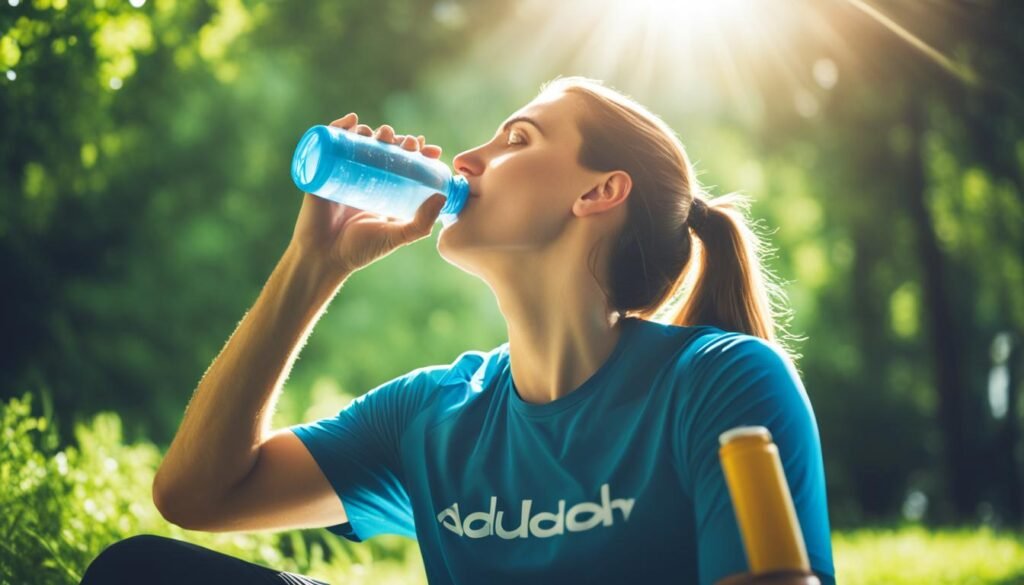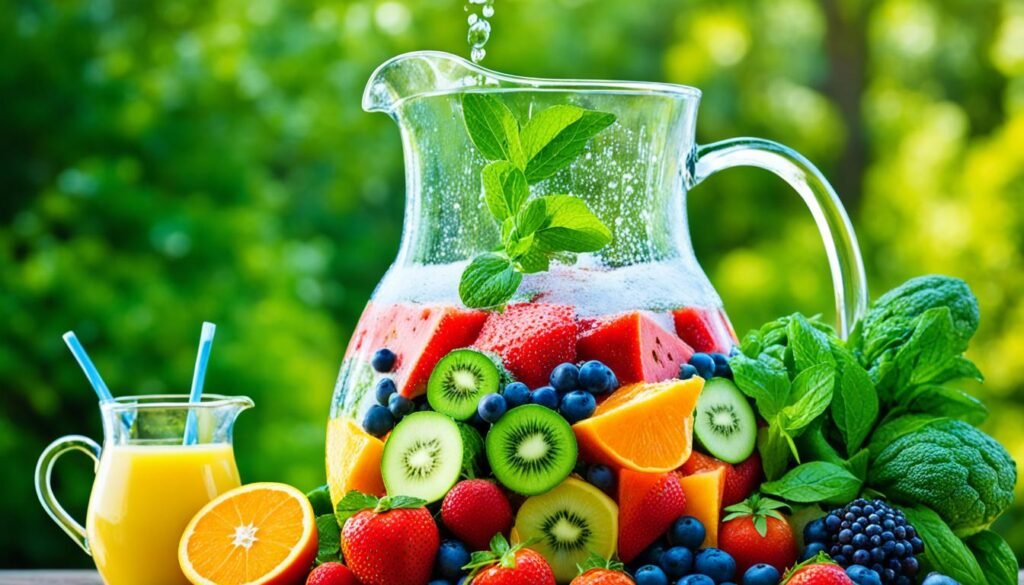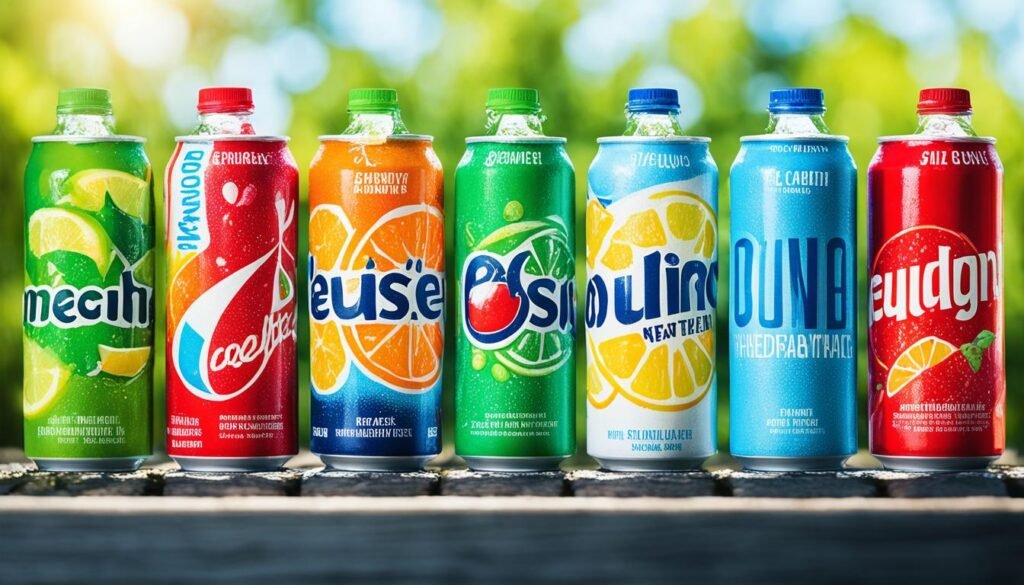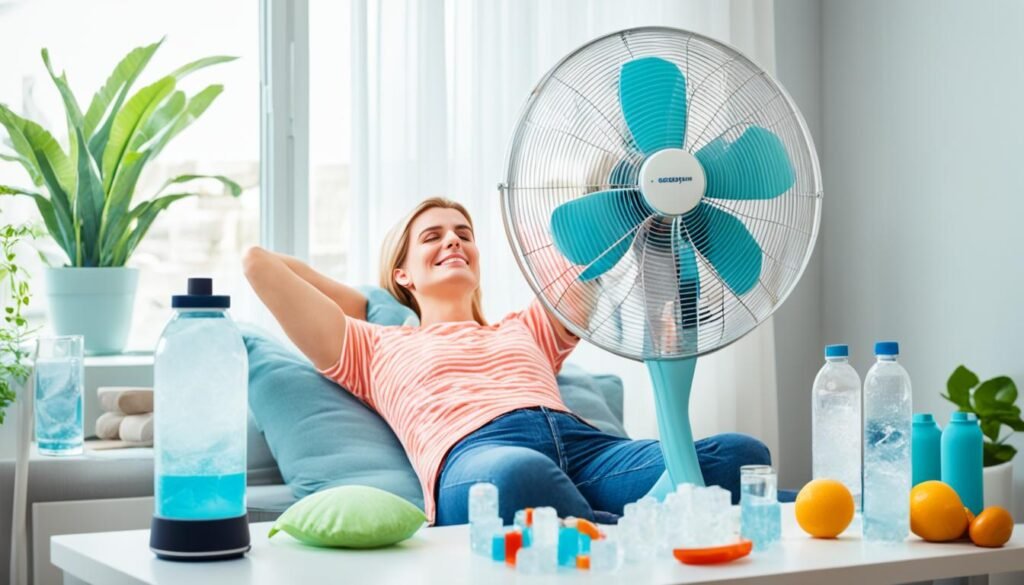Heatwaves can be very dangerous, especially for some groups like older people, babies, those who work outside, and pregnant women. It’s key to drink water often in the hot weather. Our adult bodies are mostly water, which is super important for things like moving nutrients, getting rid of waste, our blood flow, and keeping the right temperature.
Not drinking enough water can cause muscle cramps, tiredness, thirst, feeling dizzy, and trouble thinking. Drinking lots of water every day is vital, especially when it’s hot or if you’re working out. Overall, women should aim for 2.7 liters and men for 3.7 liters of water daily. This is just a rough guide, though.
Key Takeaways
- Heatwaves can cause serious health problems, especially for vulnerable populations.
- Staying hydrated by drinking water regularly is crucial during hot weather.
- The human adult body is 60% water and it is essential for many bodily functions.
- Dehydration can lead to various unpleasant symptoms like muscle cramps, fatigue, and impaired cognition.
- General recommendations suggest women should drink about 2.7 liters and men 3.7 liters of total water per day.
Understanding the Importance of Hydration
Water is vital for all life forms. It makes up a big part of our bodies, about 60%. This makes it key for many bodily functions. Water is crucial for biochemical reactions, nutrient supply, waste removal, blood flow, and temperature control.
The Role of Water in the Human Body
Water is key for our bodies to work well. It helps with our circulatory, digestive, and urinary systems. Water moves nutrients, clears toxins, and keeps our body temperature stable.
Consequences of Dehydration
If you don’t drink enough water, your body might get dehydrated. This can cause muscle cramps, tiredness, thirst, and dizziness. Other effects include thinking problems, no appetite, constipation, and even kidney stones. Dehydration is especially risky in hot weather, when active, or with certain health issues. So, staying hydrated is crucial for our bodies to work right and to avoid dehydration.
Determining Your Daily Water Intake
Figuring out how much water you need every day isn’t one-size-fits-all. It depends on lots of things. As a guide, women should try to drink 91 ounces of water daily. Men, on the other hand, need about 125 ounces each day. You can also simply [divide your weight by 2](https://www.healthline.com/nutrition/how-much-water-should-you-drink-per-day) and drink that many ounces to stay hydrated.
General Guidelines for Water Consumption
The National Academies of Sciences, Engineering, and Medicine set some standard advice. For women, they recommend 91 ounces of water a day. Men should aim for more, about 125 ounces. This includes water you drink and get from food.
Factors Affecting Hydration Needs
A person’s thirst can change depending on many things. Things like age, gender, if you’re pregnant or breastfeeding, and your health all play a part. Older people, kids, and those expecting or feeding a baby might need more water. Also, some health issues and medications can affect how much you need to drink.
It’s key to know these influences on hydration. By understanding them, you can better meet your body’s specific needs.
Staying Hydrated: How Much Water Should You Drink to Beat the Heatwave
When it’s hot, we lose more water from our bodies through sweat. This means we need to drink more. The CDC suggests a simple rule: drink 1 cup of water every 15-20 minutes when it’s hot. This is around 3/4 to 1 quart of water per hour.
But be careful not to overdo it. Drinking over 1.5 quarts (48 oz) in an hour is too much. It can cause serious health problems by affecting the salt balance in our blood.
Increased Fluid Needs During Heatwaves
Starting work dehydrated can really slow you down. To keep up, aim for 8 ounces of water every 15-20 minutes. This adds up to 24 to 32 ounces an hour. Sipping water often is better than chugging a lot at once. Remember, don’t drink more than 1.5 quarts (48 oz) of water in an hour. Over-hydration is as bad as being dehydrated.
Signs of Dehydration to Watch Out For
Dry skin and headaches are often first signs you need more water. If you feel dizzy, tired, or have muscle cramps, your body might be very short on fluids. Fainting, rapid breathing, and dark yellow urine are more severe signs.
Long-term low water levels can even lead to kidney stones. So, staying hydrated is key, even after your workday is over. If you’re severely dehydrated, get help right away.

Tips for Staying Hydrated During Hot Weather
It’s key to be proactive about staying hydrated in hot weather. Experts suggest you drink water throughout the day. Start in the morning and keep going with every meal. Don’t forget to drink extra water before, during, and after physical activity to make up for what you lose through sweat.
Hydrating Foods to Include in Your Diet
Besides water, some hydrating foods can boost your fluid levels. Fruits and veggies are great, like cucumbers, celery, and watermelon. They not only hydrate you but also bring important nutrients to the table.
Replenishing Fluids After Physical Activity
If you’re sweating a lot, sports drinks with balanced electrolytes are a good choice. They help replace lost fluids and salts. Remember, steer clear of dehydrating drinks like alcohol and sugary beverages. They can make it harder for your body to stay hydrated in the heat.

Avoiding Dehydrating Beverages
Water is key for staying hydrated, but some drinks work against this. Coffee, sugary sodas, beer, and energy drinks take water from your body. They make you lose water and can lead to dehydration. Alcohol is even worse because it increases water loss. You should avoid these if you’ve been in the sun, to prevent getting sick.
The Impact of Alcohol on Hydration
Alcohol is well-known for its ability to dehydrate you. It speeds up fluid loss, making you more likely to get dehydrated. This is even more risky when it’s hot outside, and your body is trying hard to stay cool and hydrated.
Limiting Caffeine and Sugary Drinks
Drinks with caffeine, although not as bad as alcohol, can still dehydrate you. They make your body work harder in the heat. Sugary beverages like soda and energy drinks lack important electrolytes and can dry you out. It’s better to drink water and eat foods with high water content to stay hydrated.

Keeping Cool and Hydrated Indoors
During a heatwave, it’s key to stay cool and hydrated. Use air conditioning or fans indoors to set a comfortable mood. Pull the curtains to keep the sun’s heat out. Also, avoid using appliances that make your place warmer. You can take cold showers or put cool towels on your body. This helps keep your body temperature down.
Creating a Cool Environment
To fight the heat indoors, keep the sun away. Close curtains and blinds to stop the sun’s heat from getting in. Also, try not to use things like ovens that warm up your place. Instead of cooking a lot, choose meals that don’t need much heat. Salads and sandwiches are great. Plus, they keep your place cooler.
Staying Hydrated While Indoors
Even inside, don’t forget to drink water. Keeping a water bottle close by and taking small sips helps a lot. You might not feel thirsty, but drinking regularly is very important. Try to drink water often during the day. Add fruit or herbs to your water to make it tastier. This way, you keep your body working well, even when it’s hot outside.

Outdoor Activities and Hydration
Enjoying outdoor activities and staying hydrated during a heatwave is crucial. The key is to drink water ahead of time. You should have 17-20 oz two to three hours before and another 8 oz just before starting. While being active outdoors, it’s smart to drink 7-10 oz of water every 10-20 minutes. This keeps you from getting dehydrated due to sweat.
Once you’re done, have 8 oz of water within 30 minutes to keep your body hydrated. It’s vital to carry water with you or know where to find it. Also, watch out for signs like muscle cramps, feeling tired, or dark urine. These could mean you’re dehydrated. Staying properly hydrated is key to perform well and stay safe from heat illnesses.

Special Considerations for Vulnerable Groups
In a heatwave, some people are at a higher risk of getting dehydrated. This includes kids, older adults, and those with chronic illnesses. These vulnerable groups need extra care in keeping up with their hydration needs.
Hydration Needs for Children and Older Adults
Kids lose fluids faster than adults because of their body’s size. On the other hand, older people might not feel as thirsty and their kidneys work less well. This means they are more likely to become dehydrated. It’s important for both groups to drink enough and look out for signs of dehydration.
Staying Hydrated with Chronic Conditions
Those with conditions like thyroid problems or who take special medications might need to drink more. They should talk to their doctors about their specific needs. It’s also vital for them to remember to drink water regularly. Avoiding alcohol and too much caffeine helps, too.
It’s key to focus on the needs of vulnerable people during a heatwave. By doing so, it’s easier to prevent dehydration’s harmful effects. This way, health and well-being can be better protected.
Conclusion
Staying hydrated is key, especially in a heatwave, for keeping your body healthy. Drinking enough water is vital because it helps our bodies work properly. Dehydration can cause many problems, some of which are dangerous. Women should aim for about 2.7 liters a day, while men need around 3.7 liters. These amounts can change depending on various factors. They might need more, especially in hot weather or if they’re active.
To avoid dehydration’s bad effects, make sure to drink water often. It’s also good to eat foods with a lot of water and not to drink things that make you more dehydrated. Stay cool as well. It’s smart to know the signs of dehydration. If you see them or feel sick, get help from a doctor as soon as possible. Keeping hydrated is crucial for feeling your best during hot times.
With global warming, heatwaves are becoming more common and severe. So, staying hydrated is more important now than ever. By learning how important water is for our bodies and finding ways to drink more, you can protect your health. This is especially true when dealing with extreme heat.
